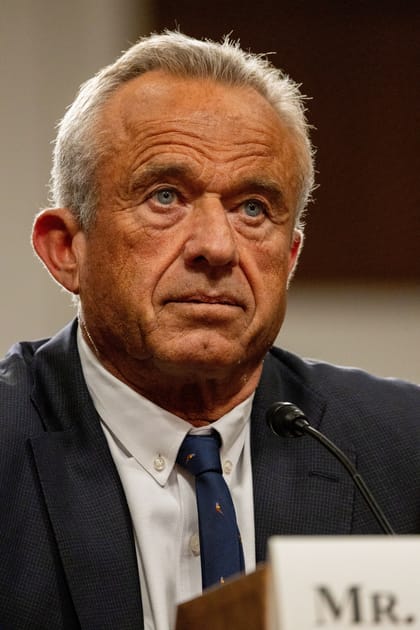The health secretary said he never told Susan Monarez to preapprove recommendations from the CDC’s vaccine advisory panel.
Health Secretary Robert F. Kennedy Jr. on Sept. 4 defended the shakeup at the Centers for Disease Control and Prevention, including the recent termination of its director.
“These changes were absolutely necessary adjustments to restore the agency to its role as the world’s gold standard public health agency, with the central mission of protecting Americans from infectious disease,” Kennedy said during an appearance before the Senate Finance Committee in Washington.
“CDC failed that responsibility miserably during COVID,” he said, pointing to how CDC guidance led to the closures of schools and businesses, as well as masking children as young as 2, while the United States recorded more than 1 million deaths due to COVID-19, according to death certificates.
“That’s why we need bold, competent, new leadership at CDC,” Kennedy said.
The Trump administration in August ousted Susan Monarez as director of the agency because, according to a White House spokesman, she was not “aligned with the President’s agenda of Making America Healthy Again.”
The termination was quickly followed by the resignations of several top CDC officials, who cited the move as one of the reasons they were leaving.
Lawyers said Monarez was fired because she declined to “rubber-stamp unscientific, reckless directives and fire dedicated health experts.”
Monarez wrote in an op-ed published Thursday that she was told to preapprove recommendations from the CDC’s vaccine advisory panel.
“It is imperative that the panel’s recommendations aren’t rubber-stamped but instead are rigorously and scientifically reviewed before being accepted or rejected,” she wrote.
When senators asked about the claim, Kennedy denied it. He said that he never met one-on-one with Monarez and that others at their meetings would back him up, including new CDC acting Director Jim O’Neill.
Kennedy also said that Monarez had made a statement that she would not approve recommendations from the panel.
“I told her I didn’t want her to have a rule [that] she wouldn’t sign onto it,” he said.
“I told her that she had to resign because I asked her, ‘Are you a trustworthy person?’ and she said ‘No,’” Kennedy told Sen. Elizabeth Warren (D-Mass.). “If you had an employee that told you they weren’t trustworthy, would you ask them to resign, senator?”
Some Democrats have called on Kennedy to resign, or on President Donald Trump to fire him if he does not. More than 1,000 current and former employees of Kennedy’s department said in an open letter released on Sept. 3 that he should step down. They noted the termination of Monarez as well as federal regulators overseen by Kennedy, limiting clearance for COVID-19 vaccines, and Kennedy’s removal of all members of the CDC’s vaccine advisory panel, known as ACIP, before replacing them. A similar call came from some medical organizations, including the Infectious Diseases Society of America.
ACIP is slated to meet in two weeks to consider advising changes to the CDC immunization schedule, including for vaccines or similar products against hepatitis B and respiratory syncytial virus.
“You’ve stacked the deck to ensure the panel bends to your views,” Wyden told Kennedy.
He said that ACIP “has lost scientific credibility.”
Kennedy said that he depoliticized ACIP, noting that some of the members had conflicts of interest. While Wyden said he’s heard from scientists and doctors who disagree with the moves, Kennedy said he’s heard from others who support them.
Sen. Bill Cassidy (R-La.), a doctor, said that Kennedy appeared to be going back on promises he made during his confirmation hearing, including that he would not limit people’s access to vaccines. Some pharmacies have stopped offering COVID-19 vaccines after the recent regulatory decisions.
“Effectively, we’re denying people vaccines,” Cassidy said.
“You’re wrong,” Kennedy said.
He added later that anybody can get a vaccine and that “I never promised I would recommend products for which there is no indication.”
Kennedy also said that he did not agree that current members who have in the past testified as paid witnesses for people suing vaccine manufacturers have conflicts of interest.
“It may be a bias, and that bias, if disclosed, is OK,” he said. “But it’s not a financial conflict of interest.”
The Department of Health and Human Services, despite a promise to do so, has not released disclosures from the new advisers.
Not all senators expressed frustration or anger with Kennedy.
“I am delighted to know you’re going to end the revolving door and the conflicts of interest,” Sen Marsha Blackburn (R-Tenn.) said. “I have found it so unseemly that people who work with the pharmaceutical or with a big food company then go back over into the CDC [and other health agencies], and then they’re signing off on regulation for their former employer, and many times their future employer, so we appreciate that.”
If you found this article interesting, please consider supporting traditional journalism
Our first edition was published 25 years ago from a basement in Atlanta. Today, The Epoch Times brings fact-based, award-winning journalism to millions of Americans.
Our journalists have been threatened, arrested, and assaulted, but our commitment to independent journalism has never wavered. This year marks our 25th year of independent reporting, free from corporate and political influence.
That’s why you’re invited to a limited-time introductory offer — just $1 per week — so you can join millions already celebrating independent news.








